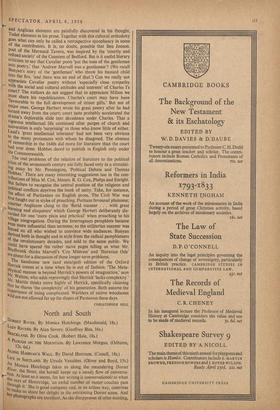Woodnotes Tame
FROM Dorm TO MARVELL. Edited by Boris Foird. (Pelican Books, 3s. 6d.) THE POETICAL WORKS OF ROBERT HERRICK. Edited by L. C. Martin. (Clarendon Press, £3 3s.) FOLLOWING The Age of Chaucer and The Age of Shakespeare comes the third volume of the Penguin Guide to English Litera- ture, From Donne to Marvell. The title of this book is thus in itself something of a manifesto : many would call it 'The Age of Milton.' Most of the ten contributors are docile pupils of Mr. Eliot and Dr. Leavis. They follow fashion in disparaging Milton by com- parison with the Metaphysicals. So' far from being the book's central figure, Milton is admitted only as a poor relation. His 'mysticism' and his debt to the Metaphysicals are stressed : Mr. Cormican even labours the obvious point that non-Christians can appreciate him. Bunyan is a gate-crasher too. In a chapter quaintly entitled 'The Humanism of John Bunyan,' Roman Catholic ,and Anglican elements arc painfully discovered in his thought, Tudor elements in his prose. Together with this cultural orthodoxy goes what can Only be called a retrospective sycophancy in some of the contributors. It is, no doubt, possible that Ben Jonson. poet of the Mermaid Tavern, was inspired by the 'courtly and refined society' of the Countess of Bedford. But is it useful literary criticism to say that Cavalier poets 'put the tone of the gentleman Into poetry,' that 'Andrew Marvell was a gentleman'? (We recall Bunyan's story of the 'gentleman' who threw his bastard child into the fire, 'and there was an end of that.') Can we really not appreciate Cavalier poetry without 'especially close sympathy with the social and cultural attitudes and interests' of Charles l's court? The authors do not suggest that to appreciate Milton we must share his republicanism. Charles's court may have been favourable to the full development of minor gifts.' But not of major ones. George Herbert wrote his great poetry after he had turned away from the court; court taste probably accelerated the drama's deplorable slide into decadence under Charles. That a vigorous intellectual life continued after purges of church and universities is only 'surprising' to those who know little of either. Laud's 'great intellectual tolerance' had not been very obvious to the many protestants with whom he disagreed. The absence of censorship in the 1640s did more for literature than the court had ever done. Hobbes dared to publish in English only under the Commonwealth. The real problems of the relation of literature to the political crisis of the seventeenth century are fully faced only in a stimulat- ing essay by Mr. Pennington, 'Political Debate and Thomas Hobbes.' There arc many interesting suggestions too in the con- tributions of Miss M. Cox, Messrs. R. G. Cox, Phelps and Enright. Hut failure to recognise the central position of the religious and Political conflicts deprives the book of unity. Take, for instance, the effect of Puritanism on English prose. The Civil War was first fought out in styles of preaching. Puritans favoured plainness; learning Anglicans clung to the 'florid manner . . . with great learning and eloquence' which George Herbert deliberately dis- carded for one 'more plain and practical' when preaching to his village congregation. During the Interregnum pamphlets became even more influential than sermons; so the utilitarian manner was forced on all who wished to convince wide audiences. Bunyan derived both in thought and in style from the radical pamphleteers of the revolutionary decades, and sold to the same public. We could have spared the rather naive pages telling us what Mr. radbrook thinks Marvell's 'Coy Mistress' and 'Horatian Ode' are about for a discussion of these longer-term problems. _ The handsome new (and enlarged) edition of the Oxford Herrick comes at a time when he is out of fashion. 'The Meta- 1?)vilYsteal manner is beyond Herrick's powers of imagination,' says k.r. Walton, who adds reprovingly that Herrick 'lacks complexity ' ',11'. Martin thinks more highly of. Herrick, specifically claiming that he shares 'the complexity' of his generation. Both assume the i.)Portance of being complicated. Warblers of native woodnotes wild are not allowed far up the slopes of Parnassus these days.
CIIRISTOPHER HILL

















































 Previous page
Previous page